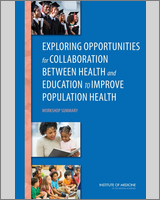NCBI Bookshelf. A service of the National Library of Medicine, National Institutes of Health.
Research based on decades of experience in the developing world has identified educational status, especially the status of the mother, as a major predictor of health outcomes and that the literature indicates that the gradient in health outcomes by educational attainment has steepened over the last four decades across the United States. Since the 1990s, while the average life expectancy in the United States has been steadily increasing, life expectancy has actually decreased for people without a high school education, especially white women.
To understand the complex relationship between education and health and how this understanding could inform our nation's investments and policies, the Institute of Medicine Roundtable on Population Health Improvement held a public workshop in Washington, DC, on June 5, 2014. This workshop, which featured presentations and extensive discussion periods, also explored how the health and education sectors can work together more effectively to achieve improvements in both health status and educational achievement. This report summarizes the presentations and discussion of the workshop.
Contents
- THE NATIONAL ACADEMIES
- PLANNING COMMITTEE ON HEALTH AND EDUCATION WORKING TOGETHER FOR COMMON GOALS
- ROUNDTABLE ON POPULATION HEALTH IMPROVEMENT
- Reviewers
- Acronyms and Abbreviations
- 1. Introduction and Overview
- 2. Why Educational Attainment Is Crucial to Improving Population Health
- 3. How Can the Health Sector Support Education Sector Efforts at the Level of Students, Families, and Schools
- 4. How the Nation’s Health Care Expenditures Reduce Education Funding
- 5. The Potential of Health Sector Partners to Contribute to the Implementation of the Best Evidence About What Supports Educational Attainment
- 6. State and Local Collaboration Between the Health and Education Sectors
- 7. Final Reflections and Comments
- APPENDIXES
Rapporteurs: Joe Alper, Darla Thompson, and Alina Baciu.
This activity was supported by contracts between the National Academy of Sciences and The California Endowment (20112338), the California HealthCare Foundation (17102), Health Partners, Health Resources and Services Administration (HHSH25034015T), Kaiser East Bay Community Foundation (20131471), The Kresge Foundation (101288), the Mayo Clinic, Missouri Foundation for Health (12-0879-SOF-12), the National Association of County and City Health Officials (2013-010204), Nemours, New York State Health Foundation (12-01708), Novo Nordisk, and the Robert Wood Johnson Foundation (70555). The views presented in this publication do not necessarily reflect the views of the organizations or agencies that provided support for the activity.
Suggested citation:
IOM (Institute of Medicine). 2015. Exploring opportunities for collaboration between health and education to improve population health: Workshop summary. Washington, DC: The National Academies Press.
NOTICE: The workshop that is the subject of this workshop summary was approved by the Governing Board of the National Research Council, whose members are drawn from the councils of the National Academy of Sciences, the National Academy of Engineering, and the Institute of Medicine.
- NLM CatalogRelated NLM Catalog Entries
- Family pediatrics: report of the Task Force on the Family.[Pediatrics. 2003]Family pediatrics: report of the Task Force on the Family.Schor EL, American Academy of Pediatrics Task Force on the Family. Pediatrics. 2003 Jun; 111(6 Pt 2):1541-71.
- Surveillance for disparities in maternal health-related behaviors--selected states, Pregnancy Risk Assessment Monitoring System (PRAMS), 2000-2001.[MMWR Surveill Summ. 2004]Surveillance for disparities in maternal health-related behaviors--selected states, Pregnancy Risk Assessment Monitoring System (PRAMS), 2000-2001.Phares TM, Morrow B, Lansky A, Barfield WD, Prince CB, Marchi KS, Braveman PA, Williams LM, Kinniburgh B. MMWR Surveill Summ. 2004 Jul 2; 53(4):1-13.
- Review Harvesting the Scientific Investment in Prevention Science to Promote Children's Cognitive, Affective, and Behavioral Health: Workshop Summary[ 2015]Review Harvesting the Scientific Investment in Prevention Science to Promote Children's Cognitive, Affective, and Behavioral Health: Workshop SummaryForum on Promoting Children's Cognitive, Affective, and Behavioral Health, Board on Children, Youth, and Families, Institute of Medicine, National Research Council. 2015 Jan 26
- Disability life expectancy for the elderly, city of Sao Paulo, Brazil, 2000: gender and educational differences.[J Biosoc Sci. 2007]Disability life expectancy for the elderly, city of Sao Paulo, Brazil, 2000: gender and educational differences.Camargos MC, Machado CJ, do Nascimento Rodrigues R. J Biosoc Sci. 2007 May; 39(3):455-63. Epub 2006 May 17.
- Review Facilitating Patient Understanding of Discharge Instructions: Workshop Summary[ 2014]Review Facilitating Patient Understanding of Discharge Instructions: Workshop SummaryRoundtable on Health Literacy, Board on Population Health and Public Health Practice, Institute of Medicine. 2014 Dec 1
- Exploring Opportunities for Collaboration Between Health and Education to Improv...Exploring Opportunities for Collaboration Between Health and Education to Improve Population Health
- DUF309 domain protein [Arabidopsis thaliana]DUF309 domain protein [Arabidopsis thaliana]Gene ID:818711Gene
- RNA-binding (RRM/RBD/RNP motifs) family protein [Arabidopsis thaliana]RNA-binding (RRM/RBD/RNP motifs) family protein [Arabidopsis thaliana]Gene ID:834047Gene
Your browsing activity is empty.
Activity recording is turned off.
See more...
